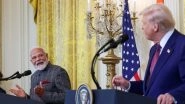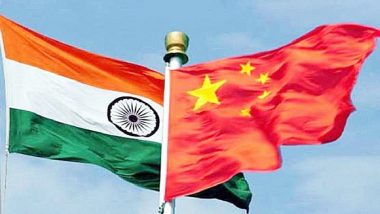New Delhi, July 2: With its military moves, China has clearly indicated that it does not desire a balanced and forward-looking relationship with India, which should recalibrate its policy towards Beijing, former Indian envoy to China Gautam Bambawale said on Thursday.
Bambawale said India should grab the opportunity of being part of an expanded G7 if it comes its way and not worry about who has been included and who is not. Nikki Haley, US Diplomat, Praises India for 'Not Backing Down' Against China.
US President Donald Trump has made a pitch for expansion of the G7 grouping by including India, Russia, Australia and South Korea. Speaking at a webinar 'G7 to 11 -- Unscrambling the post COVID Alphabet' organised by the 'India Writes Network', he said, "A few years ago there was this big discussion whether China was a responsible stakeholder in the international system and I think the answer today in the summer of 2020 is very clear and very apparent to all of us that China is not a responsible stakeholder, but is actually what I can call an irresponsible stakeholder."
One of the prerequisites in the India and China relationship is to move ahead maintaining peace and tranquility at the border, Bambawale, who was India's ambassador to China for over a year from 2017-18, said.
"By making their military moves on the ground this summer, the Chinese have very clearly indicated, not only to India but to everyone else across the world, that they do not desire a balanced, forward-looking relationship with India," he said. China has made the choice and now India will definitely respond and react, he said.
"We will reassess our China policy. We will recalibrate our China policy," Bambawale said. "The banning of 59 mobile applications is only the first step of what I see a series of steps which are coming down the pipeline. I have argued and I would hope that one of those measures will be the banning of Chinese firms from participating in India's 5G trials and roll out like many other countries in the world have done on national security grounds," he said.
Bambawale hoped that there will be a wider discussion in India on the measures to be taken in response to China's actions. "I completely agree with the point that these measures, this reassessment be done in a calm, rational manner, so that we come to a conclusion and implement policy accordingly," he said. China's National Security Law in Hong Kong: What Has Changed And Why The Legislation Has Led to More Protests?.
The expansion of the G7 to G10 or G11 is an opportunity for India to play a role in international politics and economics, he said. "I am delighted that India has grabbed it with both hands (Trump's G7 invite). It should not worry too much about who is included and who is not included. We should grab it with both hands. Let us hope it is a more permanent structure," Bambawale said.
Australia's envoy to India Barry O'Farrell, former foreign secretary Kanwal Sibal, ex-US envoy to India Richard Verna and former diplomat Anil Wadhwa also participated in the discussion. All participants welcomed the idea of an expanded G7 grouping that would reflect contemporary global realities.
(The above story is verified and authored by Press Trust of India (PTI) staff. PTI, India’s premier news agency, employs more than 400 journalists and 500 stringers to cover almost every district and small town in India.. The views appearing in the above post do not reflect the opinions of LatestLY)













 Quickly
Quickly


